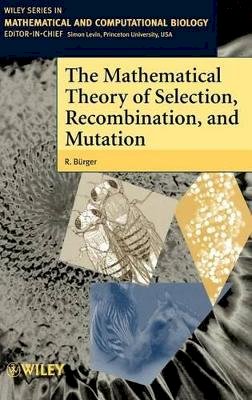
Stock image for illustration purposes only - book cover, edition or condition may vary.
The Mathematical Theory of Selection, Recombination, and Mutation
R. Bürger
€ 325.37
FREE Delivery in Ireland
Description for The Mathematical Theory of Selection, Recombination, and Mutation
Hardback. "It is close to being a masterpiece. could well be the classic presentation of the area. " Warren J. Ewens, University of Pennsylvania, USA Population genetics is concerned with the study of the genetic, ecological, and evolutionary factors that influence and change the genetic composition of populations. Series: Wiley Series in Mathematical & Computational Biology. Num Pages: 422 pages, Illustrations. BIC Classification: PDE; PSAJ; PSAK. Category: (P) Professional & Vocational; (UP) Postgraduate, Research & Scholarly; (UU) Undergraduate. Dimension: 255 x 180 x 29. Weight in Grams: 908.
"It is close to being a masterpiece...could well be the classic presentation of the area." Warren J. Ewens, University of Pennsylvania, USA
Population genetics is concerned with the study of the genetic, ecological, and evolutionary factors that influence and change the genetic composition of populations. The emphasis here is on models that have a direct bearing on evolutionary quantitative genetics. Applications concerning the maintenance of genetic variation in quantitative traits and their dynamics under selection are treated in detail.
* Provides a unified, self-contained and in-depth study of the theory of multilocus systems
* Introduces the basic population-genetic models
* Explores the dynamical and equilibrium properties of the distribution of quantitative traits under selection
* Summarizes important results from more demanding sections in a comprehensible way
* Employs a clear and logical presentation style
Following an introduction to elementary population genetics and discussion of the general theory of selection at two or more loci, the author considers a number of mutation-selection models, and derives the dynamical equations for polygenic traits under general selective regimes. The final chapters are concerned with the maintenance of quantitative-genetic variation, the response to directional selection, the evolutionary role of deleterious mutations, and other topics.
Graduate students and researchers in population genetics, evolutionary theory, and biomathematics will benefit from the in-depth coverage. This text will make an excellent reference volume for the fields of quantitative genetics, population and theoretical biology.
Population genetics is concerned with the study of the genetic, ecological, and evolutionary factors that influence and change the genetic composition of populations. The emphasis here is on models that have a direct bearing on evolutionary quantitative genetics. Applications concerning the maintenance of genetic variation in quantitative traits and their dynamics under selection are treated in detail.
* Provides a unified, self-contained and in-depth study of the theory of multilocus systems
* Introduces the basic population-genetic models
* Explores the dynamical and equilibrium properties of the distribution of quantitative traits under selection
* Summarizes important results from more demanding sections in a comprehensible way
* Employs a clear and logical presentation style
Following an introduction to elementary population genetics and discussion of the general theory of selection at two or more loci, the author considers a number of mutation-selection models, and derives the dynamical equations for polygenic traits under general selective regimes. The final chapters are concerned with the maintenance of quantitative-genetic variation, the response to directional selection, the evolutionary role of deleterious mutations, and other topics.
Graduate students and researchers in population genetics, evolutionary theory, and biomathematics will benefit from the in-depth coverage. This text will make an excellent reference volume for the fields of quantitative genetics, population and theoretical biology.
Product Details
Format
Hardback
Publication date
2000
Publisher
John Wiley & Sons Inc United Kingdom
Number of pages
422
Condition
New
Series
Wiley Series in Mathematical & Computational Biology
Number of Pages
424
Place of Publication
New York, United States
ISBN
9780471986539
SKU
V9780471986539
Shipping Time
Usually ships in 7 to 11 working days
Ref
99-50
About R. Bürger
R. Bürger is the author of The Mathematical Theory of Selection, Recombination, and Mutation, published by Wiley.
Reviews for The Mathematical Theory of Selection, Recombination, and Mutation
"an excellent reference volume" (Zentralblatt Math, Vol. 959, No. 9 2001) "...Burger's text is without equal. This is a book that should grace shelves in both mathematics and biology...that provides yet another point of contact for two communities whose interests can only grow closer..." (SIAM Review, Vol. 43, No. 4) "This is a book that should grace shelves in both mathematics and biology departments." (Society for Industrial Applied Mathematics Review, Vol.43. No.4 2001) "...it is such a comprehensive compendium that it will become the first port of call for any mathematician..." (The Statistician, Vol. 51, No.2, 2002) "...the models described here provide a fundamental underpinning to our understanding of the properties of quantitative genetic variation...." (Journal of Evolutionary Biology, Vol. 14, 2001) "...a major and significant piece of work..." (Genetical Research)
